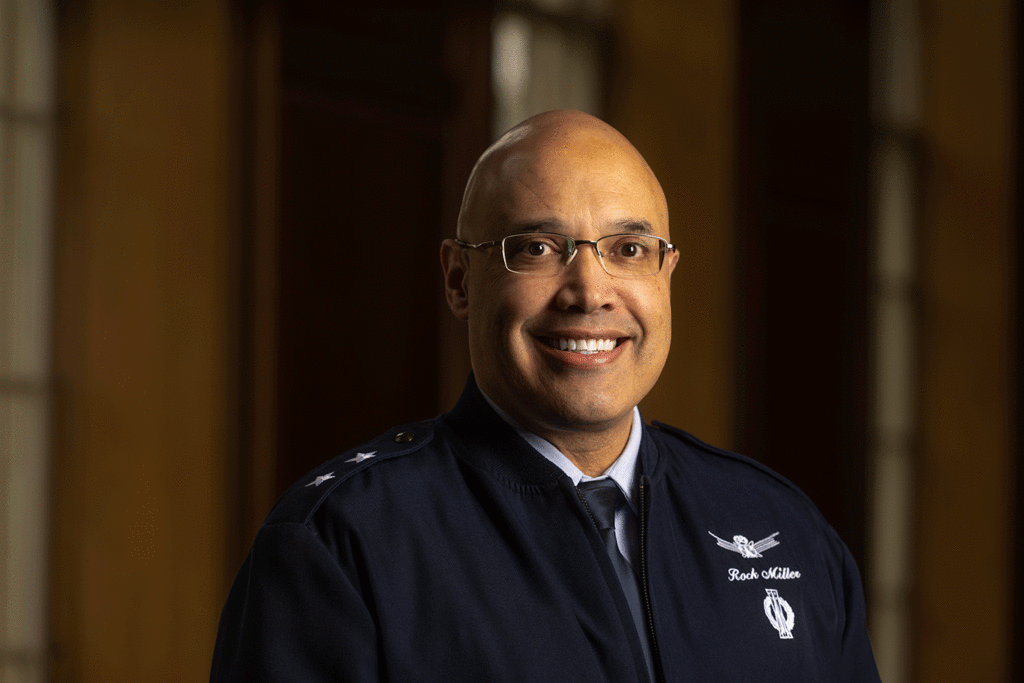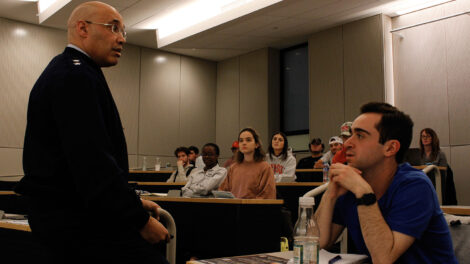Behind the scenes with Maj. Gen. David Miller Jr. ’93

Major General David Miller Jr. ’93
What made you choose Elon Musk’s StarLink satellite communications system over other options as the problem-solving exercise for Prof. Crain’s class?
“The conflict in Ukraine is timely and well publicized. Also he (Elon Musk) is a big personality that people tend to know. There’s a lot of people who don’t realize the dependence we have on space, particularly military space capabilities, let alone the growing application of commercial space capabilities. Given past Russian warnings about targeting western commercial space systems potentially aiding the Ukrainian war effort, it seemed particularly relevant subject matter, given Dr. Crain’s desire to focus on the intersection of national security and commercial policy.”
What do you hope Lafayette students will take away from your exercise and presentation in Prof. Crain’s class?
“Through the discussion, my hope is they will get a better appreciation for the impact of space capabilities on their daily lives. Also, hopefully today’s discussion can open the eyes of some on the relevance and benefits of military service. The last 30 years have been good, very good for me. But these are pretty remarkable times for national security right now. I don’t know if that’s apparent to all students. If we can educate a little bit on what’s happening globally and at the same time, raise awareness of the role that the military, in particular the Space Force and the Air Force, plays in national defense, I think those are opportunities we need to take.”
Was there a defining moment early in your career when you realized that you had made the right career choice?
“We have a program called the U.S. Air Force Weapons School where we teach the best operators in the Air Force and Space Force to become the best instructors in the world. At the time, that was the most difficult course I had been through. I didn’t realize I could learn so much in such a short period of time. They put you in with the best operators and the best instructors from across the Air Force. It’s a very strenuous course. There’s a pretty significant failure rate. But at the end of that course, I had a sense of accomplishment and an even greater sense of the strength and support of the team that I was on. I had been in for eight years at that point. In the previous few years, I had just gotten married and my son was born. Originally, I had planned on only doing four years in the Air Force, getting a master’s degree, and joining the FBI. But after I graduated from weapons school, I got to see how the whole team fights and wins together. At that point, I thought, ‘I’m going to stay and make this a career!’”
You mentioned in a previous Lafayette story that you didn’t give Lafayette the chance it deserved. However, your view changed during your time here. Can you speak more about how your impressions of the school shifted and why?
“I was originally planning to go to the Air Force Academy. I visited and realized I was looking for a little more of the traditional ‘college’ experience than the Air Force Academy was going to provide. I didn’t have an alternative plan at that point. My sister was a sophomore at Lafayette and convinced me to come here. The school put together a financial aid package that my single mom, who was on a New York City school teacher’s salary, could live with. I was appreciative of that. I didn’t really embrace Lafayette at the time because there really wasn’t a lot of diversity here. But, my sister studied abroad and convinced me to do the same to see if I could change my perspective on things. While abroad in England, I spent more time with the students that I was there with. I started giving them a chance, and it was a really good experience for me. I grew up a lot in a very short period of time. There is a saying that now I believe to my core, ‘you bloom where you’re planted’ and ‘any experience in life can be as good as you make it.’ I gave it a shot with those folks. We came back and I got to meet extended friends through them. Some of them are still my friends to this day. I became committed to Lafayette in a way that I hadn’t been before.”
What do you appreciate most about your Lafayette experience as a former student?
“I always appreciated the education and the opportunity that I received at Lafayette. I had some great professors who spent time on me, invested in me in ways that I probably hadn’t invested in myself up until that point. I learned how much people can grow when you expect ‘their best’ and not simply what they ‘believe’ or ‘want’ to do. I find people always perform better under higher expectations.”
I understand that you were a member of the Association of Black Collegians while you were a student. What are some of your fondest memories of your time with this group on campus?
“I remember coming into my civics and government class and Prof. McCartney had laid out at each seat an article with a headline that read, ‘Are Black men an endangered species in the United States?’ I remember that question hit me hard. Walt ‘Clyde’ Frazier from the New York Knicks came to speak later in the semester. He talked about the responsibility we have to each other as Americans. He relayed a couple of stories about the standards he held for himself, the standards he held for other people, but did it in a way that was lighthearted yet still motivational and demanding. And I remembered that moment caused something to click in me, in no small part because of the newspaper headline. I don’t know that I looked at the responsibility that I have to pursue excellence day-to-day in that way before. And I think it reinforced a sense of purpose and expectation in myself that I don’t think I had before … and I think I grew up quite a bit that semester.”
